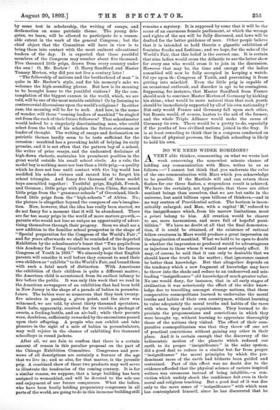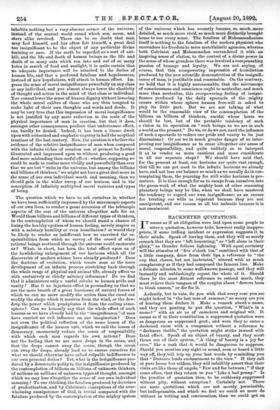DO WE NEED WIDER HORIZONS?
AVERY able thinker, commenting on what we wrote last week concerning the somewhat minute chance of holding any communication with Mars, writes to us as follows :—" I cannot but think that you underrate the value of the one communication with Mars which you acknowledge to be possible. If the Martials will and can return three flashes for our three flashes, a stupendous result is achieved. We have the certainty, not hypothesis, that there are other sentient beings than ourselves, that we are but units in the universe, lost amid billions upon billions of thinkers,—and in no way centres of Providential action. The horizon is incon- ceivably enlarged, and Man, with a capital '11,' reduced to the insignificance which, from his narrow limitations, must a priori belong to him. All creation would be clearer to me, more harmonious, and more full of hopeful possi- bilities." We have no doubt at all that the final demonstra- tion, if it could be obtained, of the existence of rational fellow-creatures in Mars would produce a great impression on the imagination of mankind. What we hold to be open to doubt is whether the impression so produced would be advantageous or injurious to those whom it would most seriously affect. It may, of course, be said that it can only be desirable that we should know the truth in the matter; that ignorance cannot be better than knowledge. But that altogether depends on the tendency which a new fragment of knowledge may have to throw into the shade and reduce to an undeserved and mis- leading " insignificance " old knowledge of much greater value. No one would deny, for instance, that in all early stages of civilisation it was notoriously the effect of the wider know- ledge due to travelling amongst strange nations, that these comparative cosmopolitans learned to undervalue the moral truths and habits of their own countrymen, without learning to value adequately the moral truths and habits of the races with whom they made acquaintance. They learned to de- preciate the prepossessions and convictions in which they were brought up, without learning to appreciate thoroughly those of the nations they visited. The effect of their com- parative cosmopolitanism was that they threw off one set of practical convictions without gaining any other in their place. And it is certain enough that the discovery of the heliocentric motion of the planets which reduced our earth to its proper "insignificance" in the solar system, did a good deal to reduce to a similar but far from proper " insignificance" the moral principles by which the pre- dominant races of the earth had hitherto been guided and restrained. Part of this effect was no doubt due to the evidence afforded that the physical science of various inspired writers was erroneous instead of being infallible,—a con- viction which unduly shook the confidence felt even in their moral and religious teaching. But a good deal of it was due only to the mere sense of " insignificance " with which man has contemplated himself, since he has discovered that he
inhabits nothing but a very obscure corner of the universe, instead of the central world round which sun, moon, and s3tars alike revolved. There can be no doubt that man may feel himself, and has often felt himself, a great deal too insignificant to be the object of any particular divine training or care. If the earth be regarded as a sort of ant- hill, and the life and death of human beings as the life and death of so many ants which run into and out of so many holes in search of food and sunlight, it is quite certain that no adequate importance will be attached to the duties of human life, and that a profound fatalism and hopelessness, instead of new hopefulness, will attach to human effort. Im- press the sense of moral insignificance powerfully on any class or any individual, and you almost always lower the elasticity of thought and action in the mind of that class or individual. You cannot lower the sense of human dignity without lowering the whole Moral calibre of those who are thus tempted to make light of their own thoughts and words and deeds. It may be very true that this impression of moral insignificance is not justified by any mere redaction in the scale of the physical importance of man in creation, but that it does, amongst other consequences, produce that unfortunate effect, can hardly be denied. Indeed, it has been a theme dwelt upon with reiterated and emphatic urgency in half the sceptical treatises of the last century. Now, the question is whether the evidence of the relative insignificance of man when compared with the infinite riches of creation can at present be further illustrated and impressed upon us without producing a good deal more misleading than useful effect: whether, supposing we could be made to realise more vividly and powerfully than ever that we are but "units in the universe, lost among the billions and billions of thinkers," we might not lose a great deal more in the sense of our own individual worth and meaning, than we should gain in the wider sweep of our horizon, and in the conception of infinitely multiplied moral varieties and types of being.
The question which we have to ask ourselves is, whether we have been sufficiently impressed by the microscopic aspects of our own lives, to render a great extension of the telescopic aspects of the rest of the universe altogether safe for us. Would those billions and billions of different types of thinkers, in the contemplation of whom we should stand a chance of losing the healthy egotism of human feeling, merely inspire us with a salutary humility or even humiliation ? or would they be likely to render us indifferent how we exercised the re- sponsibilities from which no survey of the crowd of other rational beings scattered through the universe could exonerate us ? What, in short, has been the total effect upon us of the bewildering enlargement of our horizons which all the discoveries of modern science have already produced P Does the doctrine of evolution, which treats man as the mere development of an infinite process stretching back through the whole range of physical and animal life, already affect us with exclusively or chiefly salutary influences ? Do we find that it administers only a useful rebuke to human pride and vanity P Has it no injurious effect in persuading us that we are the mere breath of a great hurricane of natural forces of which we can no more modify the action than the cloud can modify the shape which it receives from the wind, or the dew- drop the power which precipitates it from the cooling atmo- sphere ? Can we honestly say that the whole effect of such lessons as we have already had in the "insignificance " of man have exerted no evil influence on our imagination ? Does not even the political reflection of the same lesson of the insignificance of the human unit, which we call the lesson of democracy, enormously reduce the sense of responsibility with which each man regards his own actions ? Does not the feeling that we are mere drops in the ocean, and that the drops cannot sway the ocean, though the . ocean can sway the drops, already lead us to excuse ourselves for what we should otherwise have called culpable indifference to our own personal duties P Yet, what is the insignificance pro- duced by a democratic polity to the insignificance produced by the contemplation of billions on billions of unknown thinkers, of millions on millions of unknown types of thought, amongst which we may lose altogether the sense of our own individual meaning P To our thinking, the fatalism produced by doctrines of predestination, and by Calvinistic conceptions of the over- whelming omnipotence of God, is trivial compared with the fatalism produced by the contemplation of the mighty system of the universe which has recently become so much more detailed, so much more vivid, so much more distinctly brought home to our every sense. The fatalism of Ifahommedanism itself is nothing to the fatalism of the modern physicist who surrenders his freedom to mere materialistic agencies, whereas both Calvinist and Mahommedan surrendered it with an inspiring sense of elation, to the control of a divine power in the sense of whose grandeur there was involved a compensating passion of homage and loyalty. We are not saying, of course, that this overpowering impression of humiliation produced by the new scientific demonstration of the insignifi- cance of man, is justifiable and reasonable. On the contrary, we hold that it is highly unreasonable, that the microscope of consciousness and conscience ought to neutralise, and much more than neutralise, this overpowering feeling of insigni- ficance produced by the daily spectacle of the mighty causes within whose sphere human freewill is asked to play its little part. But we are not talking of what would be the reasonable view of the contemplation of the- billions on billions of thinkers, amidst whose hosts we should be lost, but of the probable tendency of such a vision in its operation on "such beings as we are in such a world as the present." Do we, or do we not, need the influence- of such a spectacle to reduce our pride and vanity to its just dimensions ? Or are we in much greater danger of so inter- preting our insignificance as to erase altogether our sense of moral responsibility, and quite unlikely so to interpret. it as to render us more cautious and more considerate in all our separate steps ? We should have said that, for the present at least, our horizons are quite vast enough,. that till we can get used to the infinite horizons we already have, and not lose our balance so much as we usually do in con- templating them, the yearning for still wider horizons is pre- mature. It is time enough for us to escape from ourselves into the guess-work of what the mighty host of other reasoning planetary beings may be like, when we shall have mastered the tendency to regard our own insignificance as an excuse for treating our wills as impotent because they are not omnipotent, and our reason as all but imbecile because it is. not omniscient.



































 Previous page
Previous page